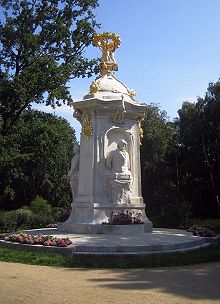
| Music of Germany | ||||||||
| General topics | ||||||||
|---|---|---|---|---|---|---|---|---|
| Genres | ||||||||
| Specific forms | ||||||||
| Media and performance | ||||||||
|
||||||||
| Nationalistic and patriotic songs | ||||||||
|
||||||||
| Regional music | ||||||||
|
||||||||
| Part of a series on the |
| Culture of Germany |
|---|
 |
| Festivals |
| Music |
Germany claims some of the most renowned composers, singers, producers and performers of the world. Germany is the largest music market in Europe, and third largest in the world.[1]
German classical music is one of the most performed in the world; German composers include some of the most accomplished and popular in history, among them Georg Friedrich Händel, Johann Sebastian Bach, Ludwig van Beethoven, Carl Maria von Weber, Felix Mendelssohn, Robert Schumann, Richard Wagner, Johannes Brahms and Richard Strauss, many of whom were among the composers who created the field of German opera. The most popular living German composer is probably film score composer Hans Zimmer.
German popular music of the 20th and 21st century includes the movements of Neue Deutsche Welle (Nena, Hubert Kah, Alphaville), disco (Boney M., Modern Talking, Dschinghis Khan, Milli Vanilli, Bad Boys Blue), metal/rock (Rammstein, Scorpions, Accept, Helloween), punk (Die Ärzte, Böhse Onkelz, Nina Hagen, Die Toten Hosen), pop rock (Sandra, Enigma, Michael Cretu, Herbert Grönemeyer) and indie (Tocotronic). Famous female singers were Marlene Dietrich and Hildegard Knef. German electronic music gained global influence, with Kraftwerk and Tangerine Dream being pioneer groups in this genre.[2][3] The electro and techno scene is internationally popular, namely due to the DJs Paul van Dyk, Scooter and Cascada.
Germany hosts many large rock music festivals. The Rock am Ring and Rock im Park festival is among the largest in the world. Since around 1990, the new-old German capital Berlin has developed a diverse music and entertainment industry.
- ^ "Bundesverband Musikindustrie: Deutschland drittgrößter Musikmarkt weltweit". Musikindustrie.de. 13 April 2011. Archived from the original on 31 December 2011. Retrieved 28 February 2012.
- ^ "Kraftwerk maintain their legacy as electro-pioneers". Deutsche Welle. 8 April 2011. Retrieved 14 May 2013.
- ^ "Tangerine Dream's Edgar Froese, Electronic Pioneer: An Appreciation". Billboard. Retrieved 24 September 2018.